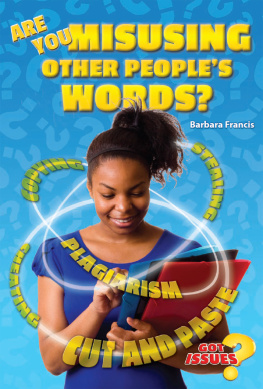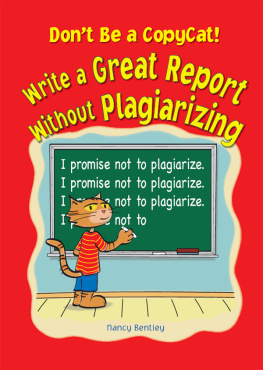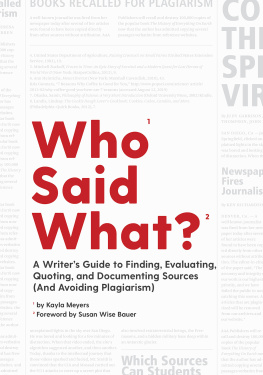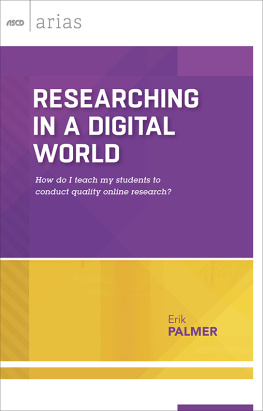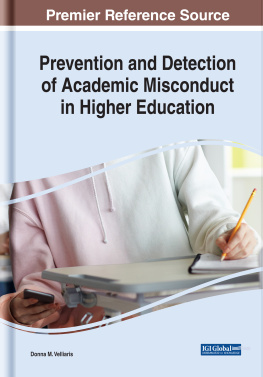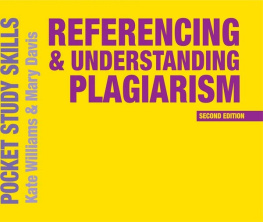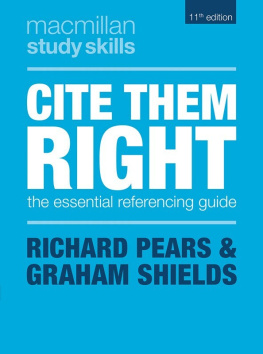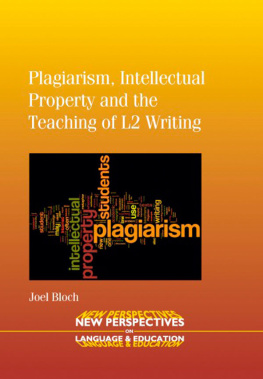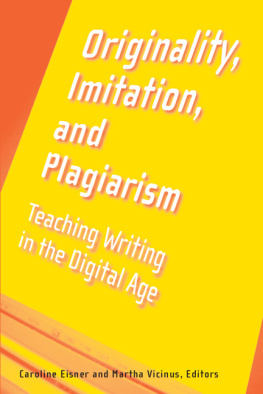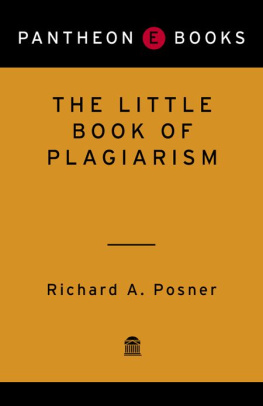STOLEN WORDS
A high school student loses her admission to Harvard. A politician is disgraced. A historian is discredited. For all these people, the offense was plagiarismtaking someone elses words and presenting them as your own. While plagiarism has been a problem since the invention of the printing press, today the Internet has made copying and cheating just a click away.


Image Credit: Thinkstock.com : Comstock
Blair Hornstine had every reason to be optimistic about her future. It was the summer of 2003, and she had just graduated from high school in Moorestown, New Jersey. But she had done something just before graduation that had turned her into a very unpopular student, not only at her school but also throughout the whole town.
However, Blair would soon be leaving town and this controversy to start a brand-new life. She planned to start her freshman year at Harvard University, one of the most prestigious schools in the country, in the fall. Her brother had just graduated from Harvard and now she would follow in his footsteps.
Blair had earned excellent grades. She had done well on her SATs. She had worked with charities and won several scholarships. Despite what she had done in high school that made her so unpopular, Blair Hornstine had Harvard. No one could take that away from her.
And then someone did.
In early July, Blair received word that Harvard no longer wanted her. The university had taken the unusual step of revoking her admissionmeaning they took it back.
One of the top colleges in the country had just told her she was no longer welcome. In addition, the story of her college rejection made headlines in newspapers and magazines all over the country.
How could this happen?
It was not because, just before graduation, Blair gained notoriety by successfully suing her Moorestown, New Jersey, school district to be named the schools sole valedictorian rather than share the honor with another student. It was not because her lawsuit asked for close to $3 million in damages. It was not because her classmates and their parents had so turned against her over her lawsuit that she had refused to attend her graduation ceremonies. And, it was not because nearly twenty-seven hundred Harvard students signed an online petition asking the university to turn her away because of all of the above.
Harvard officials discovered something about Blair that summer that caused the university to change its mind about her. They were informed that Blair Hornstine had recently been caught plagiarizing several articles and essays she wrote for her local newspaper.
You may not know what plagiarizing is, but it is serious enough to have gotten Blair Hornstine kicked out of Harvard before she even got there.
This is how Blair committed plagiarism: She took words and phrases and passed them off as her own work in six of the seven articles she had written for her local New Jersey newspaper, the Cherry Hill Courier-Post.
Blair lifted words, sometimes whole paragraphs, from very lofty sources: a Thanksgiving proclamation issued by Bill Clinton when he was president, a written opinion by former Supreme Court Justice William Brennan, and an online article by a scholar from a Washington, D.C., foreign policy institute.
The Courier-Post printed a story that acknowledged Blair Hornstines failure to attribute her source material. Attribution means to give credit to the people and places where you found your information. The newspaper also allowed Blair to write another article in which she said that she did not know that failing to credit other peoples words and ideas is wrong.
Hornstine said this about her writing process: When finalizing my thoughts, I, like most every teenager who has use of a computer, cut and pasted my ideas together. I erroneously thought that the way I had submitted the articles was appropriate. I now realize that I was mistaken. She also claimed that she was unaware that the same rules that apply to citing sources for homework papers applied as well to writing newspaper articles.
Courier-Post Executive Editor Derek Osenenko says he was certainly surprised to learn that Blair Hornstine had plagiarized many of her stories. He said, There was an understanding with everyone on the [writing] team to be original. He praised Blair for being smart, analytical and focused but admits that she had a lapse in judgment.
A major Philadelphia newspaper, The Daily News, jumped on the story and wondered how someone so smart could plead ignorance when caught plagiarizing. The newspaper also commented about Blairs lawsuit to be sole valedictorian, Now it turns out that the girl who wouldnt share wasnt above stealing other peoples words.
By all newspaper accounts of Blair Hornstines dealings with Harvard, she was permitted to talk to university officials about her plagiarized material. Harvards student handbook was very clear about plagiarism. It stated, Students should always take great care to distinguish their own ideas and knowledge from information derived from sources. The handbook went on to say, Students who, for whatever reason, submit work either not their own or without clear attribution to its sources will be subject to disciplinary action, and ordinarily required to withdraw from the College.
Harvard has a policy of not discussing individual admissions problems and officials would not discuss Blairs situation with journalists. Though Blair Hornstine was not yet a Harvard student, university officials stood firm when reporters called them for comment.
The school has a very famous newspaper called The Harvard Crimson. A Crimson article quoted the schools director of admissions, who said that the university could revoke an admission if it questioned a prospective students honesty, maturity or moral character. The Crimson also quoted an unnamed source who said that it would be very unusual for Harvard not to act against an individual whose plagiarism was confirmed.
Despite her explanations to the school, Blair Hornstine was turned away from Harvard.
The whole idea of plagiarism can be confusing, particularly as students begin to write more in-depth papers that require more complex research. Plagiarism should be openly discussed in a classroom so that the rules surrounding it become quite clear to all the students. As we saw in the case of Blair Hornstine, the consequences for not learning this can be very serious.
When someone plagiarizes, he or she is cheating. To plagiarize is to take work that is not your own and submit it as your own, without giving credit to the person who created it. Plagiarism is dishonest. Plagiarism is not only cheating, it is also a form of lying and a form of stealing.
Imagine spending weeks working hard on a homework paper only to have another student take the paper, put his name on it, and submit it as his own. You would feel that you had been cheated and the other student had stolen from you.
Plagiarizing can be even more confusing because the word can be applied not only to people who do it on purpose but also to those who do it accidentally. People plagiarize accidentally because they either do not know much about plagiarism or they just have sloppy work habits. For instance, if you forget to put quotation marks around a sentence you used from a library book, you are accidentally plagiarizing, but plagiarizing nonetheless.

